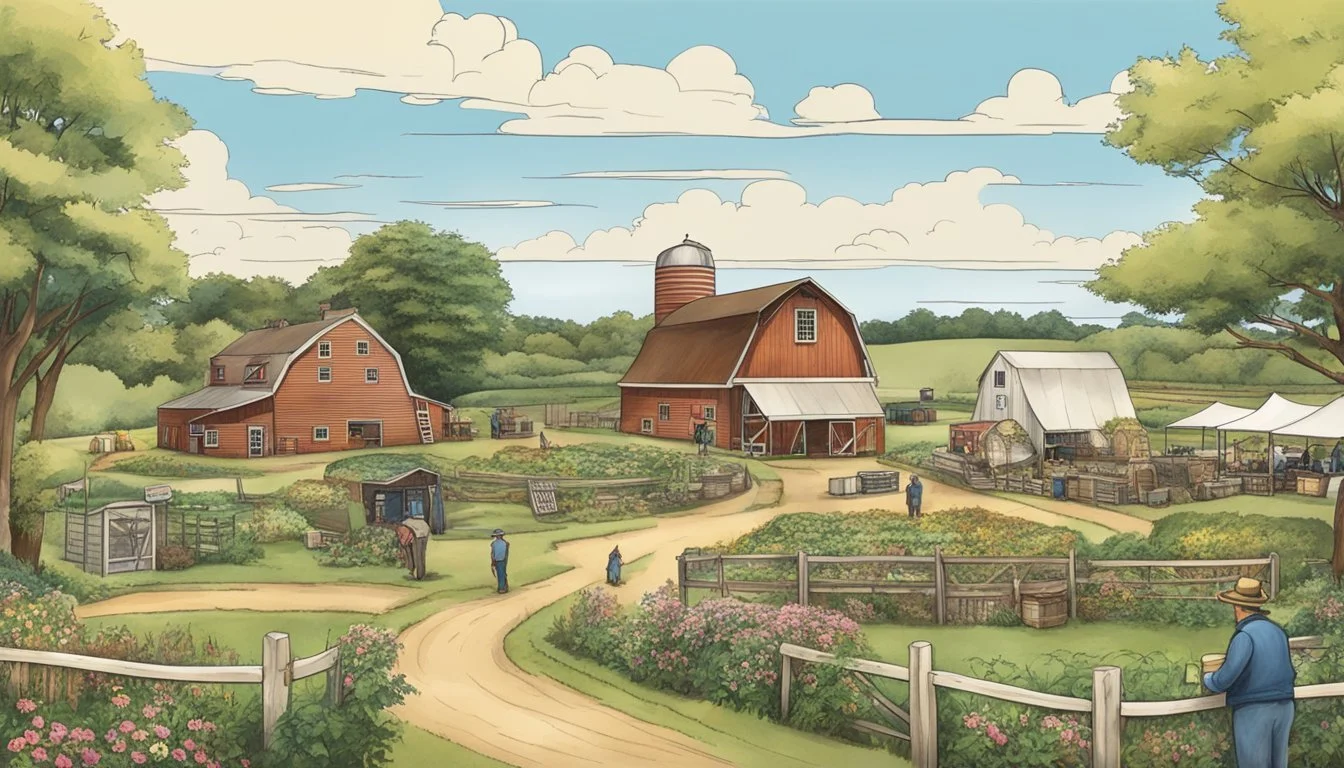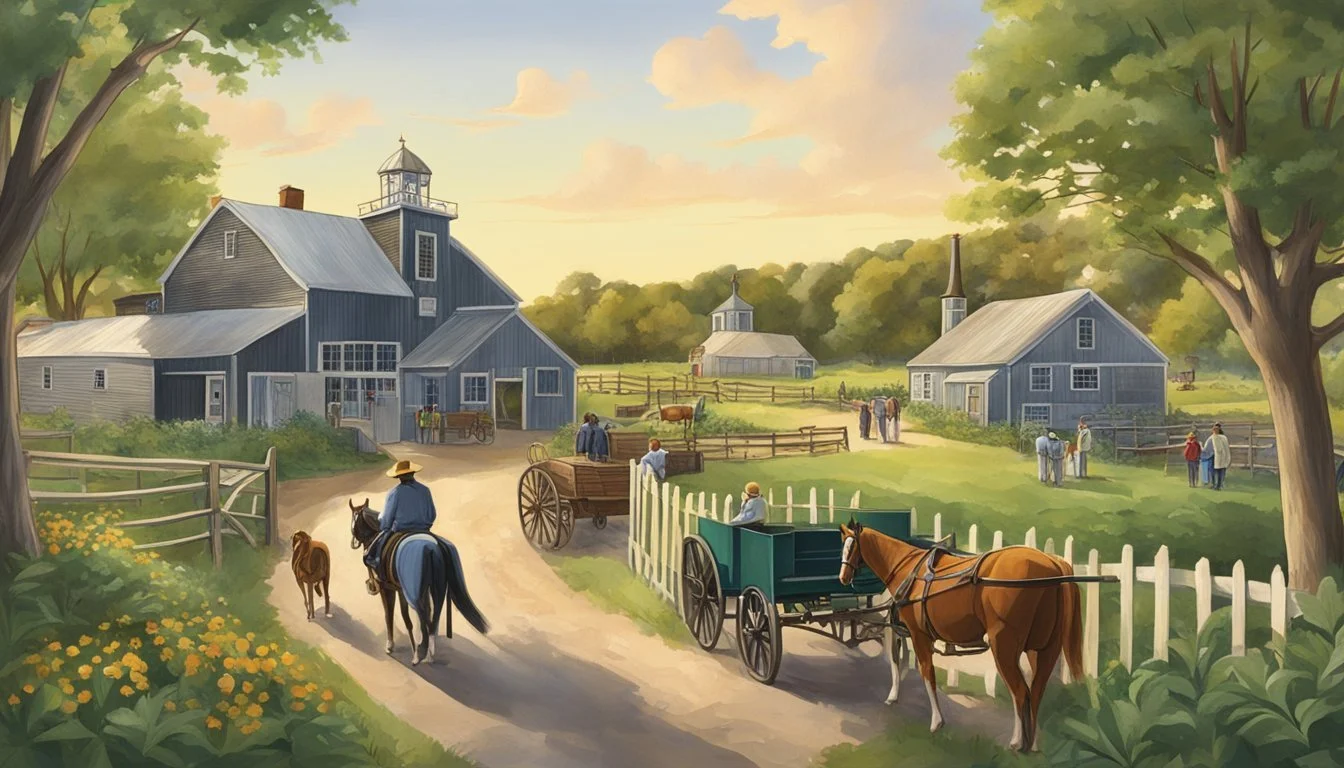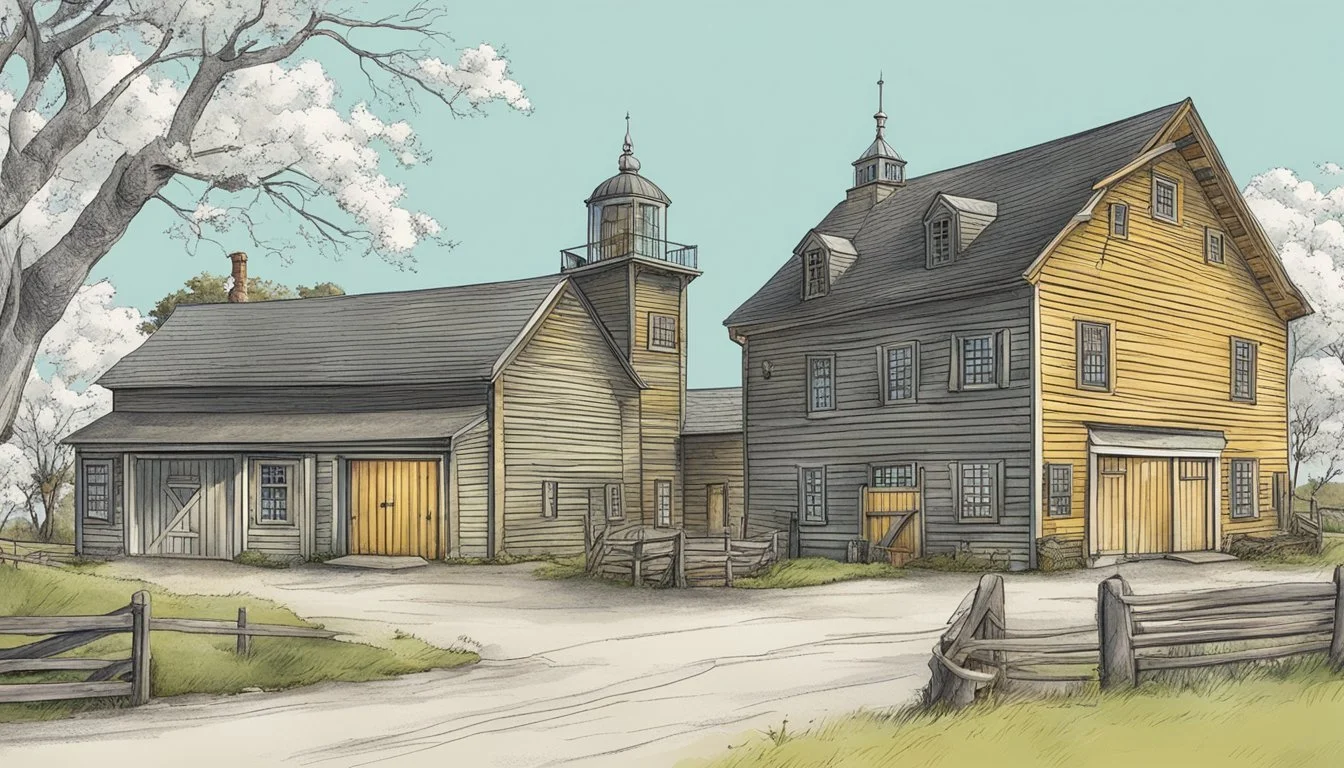Historical Farms and Agricultural Museums in Rhode Island
A Guide to Agrarian Heritage
Rhode Island, the smallest state in the United States, offers a unique window into America's agricultural past through its historical farms and agricultural museums. These sites not only preserve the natural beauty and heritage of the region but also provide educational experiences that bring to life the farming practices and lifestyles of earlier times. Visitors and residents alike can explore these living history farms to gain insight into the state's agrarian culture and the evolution of farming techniques over the centuries.
The fascination with Rhode Island's rural history is exemplified by institutions like the Coggeshall Farm Museum, which meticulously reenacts 18th-century farm life on its 48 acres of coastal land. Another notable example is Casey Farm, where both guided tours and a seasonal market showcase the state's commitment to preserving and sharing its agricultural heritage. The South County Museum further contributes to this preservation effort by chronicling the rural history of southern Rhode Island through a collection of artifacts and exhibits, contextualizing the past in a tangible and engaging manner.
Historical Overview of Rhode Island Agriculture
Rhode Island's agricultural history is marked by its transition from subsistence crops to market-driven production. In the 19th century, farming dominated the landscape, with 335,128 acres of improved farmland by 1860. The small size of the state belied its agricultural productivity, especially in terms of dairy, vegetables, and fruit, alongside staple crops like corn.
During the Revolutionary War, Rhode Island's agriculture played a vital role in supporting local and continental forces. The state's farms provided necessary sustenance for those fighting, while also being part of the trade network that financed the revolution.
Post-war, Rhode Island's trade and agricultural prosperity continued. The 19th century saw innovation with the establishment of institutions such as the Coggeshall Farm Museum, which now showcases the history of farming during the late eighteenth-century. Despite the state's push towards industrialization, agriculture remained a key component of Rhode Island's economy.
The landscape of Rhode Island agriculture has changed significantly over the centuries. A census estimate from 1920 cited nearly 331,600 acres in farmland, a testament to the state's agrarian roots. Today, visitors can engage with this rich history at various museums and historical farms across the state, gaining a deeper understanding of Rhode Island's agricultural legacy.
Key Historical Farms in Rhode Island
Rhode Island's agriculture is richly woven with history, evident in its well-preserved farms and the agricultural museums that continue to tell their stories. These farms not only highlight the state's farming techniques but also emphasize conservation efforts, keeping history alive for future generations.
Casey Farm
Casey Farm stands as a prime example of colonial farms and is a testament to the long history of agriculture in Rhode Island. Recognized on the National Register of Historic Places, this farm underscores the complex history of forced labor by Indigenous and African peoples in its early operations. Today, Casey Farm focuses on preservation, offering educational programs and community-based agricultural opportunities.
Gilbert Stuart Birthplace and Museum
The Gilbert Stuart Birthplace and Museum is not only the childhood home of the famed American portraitist but also features a fully operational snuff mill, symbolizing Rhode Island's diverse agricultural and industrial history. Surrounded by 23 acres of protected woodland, the site offers insight into both the artist's early life and the 18th-century farming practices.
Coggeshall Farm Museum
Situated in Bristol, the Coggeshall Farm Museum provides a living history experience, highlighting the domestic lives of late 18th century tenant farmers. Coggeshall Farm Museum brings history to the present by enabling visitors to partake in activities such as hearth cooking, animal husbandry, and handcrafts, showcasing traditional farming methods.
Agricultural Museums and Exhibits
Rhode Island offers a rich tapestry of historical farms and agricultural museums. These institutions preserve the legacy of early American farming practices and provide educational exhibits about the state's rural heritage.
Rhode Island Historical Society's Farms
The Rhode Island Historical Society operates multiple properties that serve as windows into the past, where one can experience the agricultural way of life. These farms are not only part of the Providence area's historical landscape but also act as living history museums. The society ensures that these sites are preserved for educational purposes, offering insight into farming techniques from bygone eras.
Smith's Castle
Located in North Kingstown, close to Newport, Smith's Castle is a historical landmark dating back to the mid-17th century. It serves as a testament to Rhode Island's colonial past, with a focus on agriculture during the pre-Revolutionary War period. Visitors can explore a variety of historical exhibits that delve into the day-to-day operations of what was once a thriving plantation and port of significance in the region.
Prescott Farm
Prescott Farm is a historic site positioned near the coastline of Newport. This pastoral landscape offers a glimpse into 18th-century farm life. Among its attractions is a fully restored windmill, which stands as a symbol of Rhode Island's agricultural and industrial past. Educational programs at Prescott Farm often feature hands-on activities, bringing the rich history of this former working farm to life.
Educational Programs and Events
Rhode Island's historical farms and agricultural museums offer a diverse array of educational programs and events, providing immersive experiences in agriculture, history, and conservation.
Historic New England's Educational Outreach
Historic New England offers a variety of farm-based education programs. At Casey Farm, visitors can engage with animals, explore a historic cemetery, and visit a museum gallery. The programs aim to acquaint participants with the agricultural past through hands-on experiences and learning opportunities.
Public Archeology at Jamestown Windmill
Jamestown Windmill provides a unique platform for public archaeology, involving the community in archaeological digs and research. These events are designed to educate and inspire interest in local history and pre-colonial life.
Heritage Workshops at Watson Farm
Watson Farm specializes in heritage workshops. They emphasize traditional farm practices, including sheep shearing and wool spinning, and educate attendees about sustainable agriculture. These workshops highlight the importance of heritage breeds and heirloom crops in today's world.
Preservation Efforts and Organizations
Rhode Island is proactive in preserving its agricultural heritage through various preservation efforts and organizations. The Rhode Island Historical Preservation & Heritage Commission oversees the protection of historic buildings and sites, including farms.
Historic New England owns and operates properties like Casey Farm, a model of historic preservation in agriculture. This farm provides insight into centuries-old farming practices and the evolution of agriculture in the region.
Rhode Island Historical Society: This organization plays a crucial role in preserving the state’s cultural heritage, which includes historical farms.
Local preservation societies and coalitions work diligently at the grassroots level to protect properties of historical significance, and the same is reflected in the community's involvement in historical farms preservation.
National Register of Historic Places: It's a key platform for recognizing farms with historical value, ensuring their stories and contributions are acknowledged and safeguarded for future generations.
Organization Role in Preservation Significance RI Historical Preservation & Heritage Commission Statewide program for historic preservation Protecting historical sites including farms Historic New England Stewards of historical properties like Casey Farm Preserving agricultural history Local Preservation Societies Grassroots efforts to save historic properties Maintaining local heritage and identity National Register of Historic Places Federal listing of historical sites Recognition and protection of historic farms
The collective efforts of these organizations have been instrumental in not only preserving the physical structures but also in maintaining the historical integrity of Rhode Island's agricultural past.
Tourism and Visitation Information
Rhode Island's historical farms and agricultural museums offer a unique glimpse into the state's rich history. Potential visitors can find detailed visitation information, ticketing options, and online resources to enhance their experience.
Visiting Historic Farms
Coggeshall Farm Museum presents an immersive venture into 18th-century farm life. It is located on 48 acres of coastal Rhode Island farmland and showcases a living history environment. The museum provides a vibrant portrayal of rural life during the post-Revolutionary era up to the dawn of the Industrial Revolution. Visitors should consult the Coggeshall Farm Museum's website for current opening hours, as they may vary each season.
Ticketing and Membership Details
Admission to these historical sites can vary, but often includes a range of pricing options. Here is a brief guide for prices and memberships:
Individual Tickets: Prices are typically modest, offering affordable access. Certain events or seasons may affect pricing.
Memberships: Membership options often exist, granting unlimited visits and supporting the preservation of these historical sites.
Visitors should verify ticket prices and membership details online as they are subject to change.
Virtual Tours and Online Resources
For individuals unable to visit in person, historical farms like Coggeshall Farm Museum provide virtual tours and extensive online resources. These allow for a digitally immersive experience into the Victorian era and Rhode Island's agrarian past. Sharing photos and engaging with the sites online helps support and spread awareness of their cultural significance. The Warwick Office of Tourism website may offer additional information and resources for exploring Rhode Island's historic farms and museums virtually.
Cultural and Artistic Influence
Historical farms and agricultural museums in Rhode Island serve not only as preservers of agrarian practices but also as vital stewards of art and culture. They act as venues where the interplay of art, fashion, and maritime history is explored and celebrated.
Art and Fashion at Rough Point Museum
Rough Point Museum, once the home of heiress Doris Duke, showcases an impressive collection of European art that adorns the walls of this storied Newport mansion. A notable feature is the Queen Anne-style music room that not only highlights exquisite art but also hosts concerts, accentuating the home's historical ambiance with the sound of classical music. Fashion enthusiasts will find the museum's periodic fashion exhibits, which showcase everything from Duke's personal wardrobe to broader fashion trends, a testament to Rhode Island’s rich cultural tapestry.
Warwick Center for the Arts
At the Warwick Center for the Arts, visitors experience Rhode Island's vibrant art scene. Housed in the historic Kentish Guard Armory, the center provides a platform for local artists through exhibitions and workshops. The space thrives as a creative hub in Warwick, with programming that frequently engages with topics related to the local heritage, intertwining visual arts with the region's agricultural narrative.
Steamship Historical Society of America
Maritime heritage, important to Rhode Island's identity, is meticulously preserved by the Steamship Historical Society of America. The society's extensive collection chronicles the engineering and design evolution of steamships, with detailed models and artifacts that also illustrate the role steamships played in the cultural exchanges between ports and people, including the transportation of agricultural goods. This rich history provides a broader context to Rhode Island's economic and cultural development.
Historic Farms as National Landmarks
Rhode Island has several farms that have earned the prestigious designation of National Historic Landmark. These farmsteads are significant for their cultural and historical value and offer a glimpse into the agricultural practices and lifestyles of the past.
Casey Farm, located in Saunderstown, is a prominent example that dates back to the 18th century. This farm operated using forced labor by Indigenous and African people, which was a common practice during that time. Preservation efforts have allowed Casey Farm to serve as an educational site on the horrors of slavery.
Watson Farm in Jamestown represents the quintessence of a coastal farmland, carefully utilized for centuries, first by Indigenous populations, and later for pasture by European colonizers. This farm, established in 1796, showcases sustainable farming practices and is a testament to the state's agrarian history. For more on the farm's history, its connection with Jamestown, and the sustainable practices in place, one can refer to Watson Farm's page.
Rhode Island's agricultural museums are also instrumental in preserving these historic landscapes. For example:
Coggeshall Farm Museum acts as a living history site, showcasing the life of salt marsh tenant farmers in the late 18th century. The museum emphasizes the day-to-day life of the era, helping one understand the complexities of agricultural life.
Many of these historic properties are not just landmarks but also part of the National Register of Historic Places, ensuring their stories remain a rich part of Rhode Island's heritage.
As these farms are spread across the state, they reflect the varied agricultural history from county to county, providing a rich educational resource for understanding America's development from its agrarian roots. For a comprehensive list of these landmarks spread across Rhode Island, including the ones that fall under Queen Anne styles or other architectural influences, one can visit the Wikipedia page on the state's National Historic Landmarks.
Agritourism and Local Cuisine
Agritourism in Rhode Island offers a chance to explore a rich blend of culinary traditions and agricultural heritage. The state's small size belies the diversity in its agritourism and local cuisine, making it a particularly inviting destination for food enthusiasts and history buffs alike.
Farmers' Markets and Seasonal Produce
In Rhode Island, farmers' markets are a showcase for the state’s agricultural diversity, featuring produce that captures the essence of each season. Portsmouth and South County are notable for their vibrant markets, where seasonal fruits like apples, and especially corn, take center stage. Visitors can enjoy the freshest produce, often picked from the surrounding farmland the very same day.
Portsmouth: Dedicated stalls overflowing with the area's renowned corn.
South County: A diverse array of fresh, local fruits and vegetables, from summer berries to autumn's squash.
Farm-to-Table Dining Experiences
The farm-to-table movement thrives in Rhode Island, with an array of dining experiences that highlight local ingredients. West Bay and Blackstone Valley restaurants expertly marry tradition with innovation, using products like Block Island's fresh seafood to create elevated yet approachable dishes.
West Bay: Expertly crafted dishes showcasing the freshest catches from nearby waters.
Blackstone Valley: Hearty, locally-sourced meals reflecting the area's agricultural roots.
Food Festivals
Food festivals in Rhode Island are a gastronome's delight, spotlighting the local cuisine’s depth and diversity. Whether it's celebrating South County's bountiful harvests or Block Island's seafood, these festivals serve as a testament to the state's rich culinary culture.
South County: Festivals featuring an array of dishes made from freshly harvested corn and other local produce.
Block Island: Celebrations of the island’s seafood bounty, from casual clam shacks to gourmet dining events.









